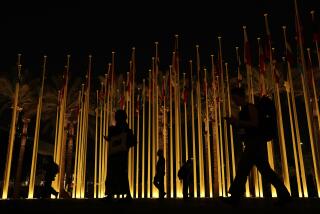OPEC Talks Stall in Wake of Iraqi Attack on Tehran
GENEVA — Negotiations toward higher oil prices suddenly bogged down Saturday at the meeting of the Organization of Petroleum Exporting Countries, the apparent result of a major Iraqi bombing foray into Iran and strategic disputes in OPEC’s effort to cut oil production.
The impasse reversed the bargaining momentum that had led some ministers to promise an agreement by this weekend. It also set the stage for oil prices to tumble when the financial markets open Monday.
The OPEC ministers convened Thursday to find ways of boosting the price of crude oil to $18 a barrel. The cartel sought a quick accord to present a united front to the world after months of disarray wrought by the collapse in oil prices.
But after two days of apparent progress toward a scheme to trim oil output by at least 5%, the ministers cut short their second Saturday session and said they won’t meet again as a group until Monday. Committee meetings were planned for today to work out the snags in their complicated plan.
The interruption raises the possibility that the talks will drag on for days--a prospect that OPEC ministers had dearly hoped to avoid because it could create uncertainty among buyers and sellers of oil around the world and send prices down instead of up.
The cartel’s meeting at the Inter-Continental Hotel here continued to operate under an unofficial news blackout, and no explanation was given for the interruption in the talks. But Iraq’s bombing Saturday of the Iranian capital of Tehran, the first attack there in seven months, was widely perceived to have poisoned the bargaining atmosphere at a time when the oil ministers’ give-and-take on slashing oil output was already getting sticky.
However, those few ministers who offered comment Saturday insisted the obstacles to an oil-production pact can be overcome in a few days.
‘We Need More Time’
“We need more time,” said Oil Minister Mana Said Oteiba of the United Arab Emirates. “So let us enjoy our weekend and cook it on a quiet fire. We will get an agreement, if not today or tomorrow, then the next day.’
A day earlier, Oteiba had flatly predicted that an agreement to cut oil production would be reached Saturday.
Sheik Ali al Khalifa al Sabah, oil minister of Kuwait, said: “We may be three-quarters of the way there. But the last one-quarter is difficult.”
Analysts say a cut in OPEC oil production of 5% would nudge prices of crude oil up by $4-$5 to the $18-per-barrel range for OPEC grades of oil. That would be welcome news to oil companies and oil-patch communities but would raise gasoline prices 8 cents to 10 cents a gallon.
Complex Situation
The abrupt delay in the talks underscored how complex OPEC’s situation has become, with two key members waging a bloody war and all of them facing economic crises of widely varying severity due to this year’s nose dive in oil prices.
Iran and Iraq, at war for six years, are also at odds in one of the major unresolved issues in the current OPEC bargaining.
In one of the few clear statements to emerge from any of the OPEC delegations in the current meeting, Iran insisted that Iraq be subject to the same oil production quotas as everyone else. Under temporary quotas scheduled to expire Dec. 31, Iraq is the sole OPEC member exempted, and it has been pumping all the oil it can to finance its war against Iran.
At the same time, Iraq’s air force has repeatedly struck Iranian oil facilities and kept Iran’s oil production far below its quota. The combination of depressed oil prices and anemic production has been a double blow to Iran’s economy and war effort.
Mundane Complications
But there are more mundane economic complications facing the OPEC members, who are seeking to trim a world oil glut which they created themselves and which drove crude oil prices from $30 per barrel a year ago to the $13-$15 range now.
Iran leads an OPEC majority that wants a cut in oil production to correct the supply-and-demand imbalance, and OPEC’s biggest producer, Saudi Arabia, apparently came to that view in the past few days.
But Gabon’s oil minister, Etienne Guy Mouvagha-Tchioba, said Saturday that there are disagreements over how far oil production should be cut overall, whether each nation should cut back by the same percentage, and what production figure should be used as the starting point for calculating the reductions.
Ceilings Assigned
Under a temporary accord put in place last August, which succeeded in boosting prices from the $10 range, the OPEC nations are assigned daily production ceilings that add up to about 17 million barrels per day. But some members are cheating, raising the question of whether new cutbacks ought to be from the quotas or from the levels of oil actually being pumped.
Extremely bullish newspaper accounts of the initial OPEC talks last week served to drive up by nearly $1, to $16.10 a barrel, the price that traders were willing to pay Friday for future delivery of crude oil on the New York Mercantile Exchange. But with the outlook suddenly hazier, analysts said that prices of futures contracts stand to drop sharply Monday in New York and London trading.
“Prices are likely to weaken in the wake of OPEC’s failure to reach an agreement,” said Fergus MacLeod, an OPEC analyst for the British brokerage firm Barclays, who is attending the OPEC negotiations. “They probably won’t go down to where they before, unless there are more problems . . . (today).”
More to Read
Inside the business of entertainment
The Wide Shot brings you news, analysis and insights on everything from streaming wars to production — and what it all means for the future.
You may occasionally receive promotional content from the Los Angeles Times.










